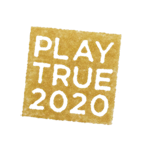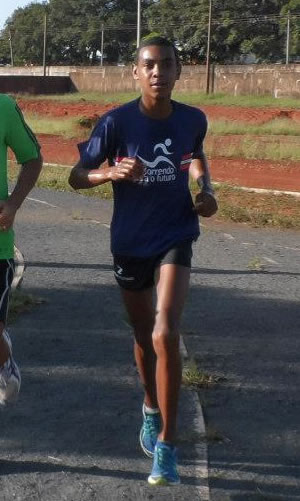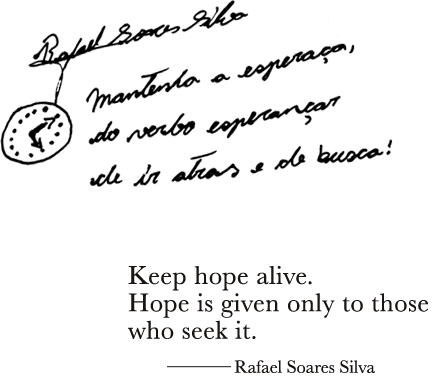




© Keita Yasukawa

The way I see it, each of us as a person has been blessed by God with a particular talent. I was given the talent of being able to run fast. I thank God for giving this great talent to me, feel great happiness because of it, and keep my esperança (hope) alive. That keeps me running. Running is everything for me.
“Keep hope alive. Hope is given only to those who seek it.”
Five years ago I encountered this quote in a book by the Brazilian author and psychiatrist, Roberto Shinyashiki. I was 15 years old at the time. It took me a while to figure out what he meant and be able to reflect it in my life, but now those words are deeply etched in my mind and are always with me wherever I go.
I have two important esperanças.
The first is to help my family living in a favela (slum) in my home town, Brasilia. The other is to become a great, world-class runner. Regarding this second esperança, I have specific target record times, but I will keep them a secret for now.
I’m still only 20 years old, but have already taken many side roads and detours on my path to date. From such experiences, I have learnt the importance of having esperanças. I have come to really make track and field a part of my life. Accordingly, my understanding of competing in track and field has deepened.
You can’t become a competitive runner in a day. It is necessary to patiently train yourself from the very basics, and build up your career as an athlete. It takes a long, long time. With a humble attitude and great hopes in my heart, I keep on running ahead.



I was born in a favela in Brasilia, the capital city of Brazil. My parents parted ways when I was very young, and I was brought up by my father. My first encounter with long-distance running was at age 10. The principal of our elementary school encouraged me to participate in a local endurance running competition. I was a bit of a rebel then, and the only reason I followed his suggestion was that I wanted the first prize: a bicycle.
By age 14, I had won myself three bicycles and was seen as having real talent, so I began athletic training in earnest. At that time, however, my friends in the favela would ask me to join them, and I started going to parties, drinking, and getting involved in drugs.
I stopped going to school, and started living a wild kind of lifestyle, meaning I often didn’t even come home. Fortunately I received an invitation from a Sao Paulo track and field club, which I took up as an opportunity to farewell the favela in which I had grown up with my friends.
However, I didn’t give track and field my all, and gave in to the temptation to meet up with my friends in the favela whenever I went back home. Without having identified to myself what I really wanted to do, I fell back into drink and drugs, and would then make a half-hearted effort to return to training. I was half-baked in my approach, so repeated this pattern.
It wasn’t until three years ago, when I was 17, that I finally came to my senses. My elder brother got shot in a fight between rival gangs. I realised that the way I was going may have led me to the same fate as well. I was heading for one of only two places: a coffin or jail.
I am very regretful that it wasn’t until I lost my beloved brother that I finally came to my senses, but the incident opened my eyes and I decided to change. I swore to myself to move ever forward so as to never have that same kind of regret again.

© Keita Yasukawa
I can never completely get over the sadness of my elder brother’s death. I changed and cleaned up my act and started living a life with purpose after his death.
At the moment I live in a town called Petropolis, in a valley on the outskirts of Rio de Janeiro. Two years ago, when I was 18, I began training at a track and field club based here in this town. Since having started living there, my life and my way of thinking have been transformed. First, I have come to study more. I am looking to enter university next year, and currently attending night school for that purpose. And during the day, it’s out and out training.
I have been able to make a living thanks to the prize money I have received from races and the support from sponsors, and am able to send money to my father back home.
It makes me really happy when I can see my father happy at my having become independent.
Whenever I face difficulties and am having a hard time in my daily training, my father and my brother come up in my mind all the time. My family is a great motivation for me, and is always there right behind me propelling me forward.
Even now, when I go back home, I get to meet my old friends from the favela. But I’ve changed. I’m not the same person I once was. I’ve grown a lot, and now I can say “NO!” to things they try to get me to do. Now I’m able to turn around and warn them against them.
It’s easy to toss away opportunities. I’ve wasted lots of opportunities to date. But now I’m growing, in order to build a life full of esperanças. That’s me now.


© Keita Yasukawa
I felt very fortunate to be able to take part for the first time in the Tokyo Marathon (February 2016). I am grateful to the people at the Ministry of Foreign Affairs of Japan who invited me as part of the exchange programme that takes place between Tokyo and Rio de Janeiro.
In the end, the result was a disappointing sub-4:00, but I hope I will be running in the city of Tokyo again as a Brazilian representative marathon runner in the Tokyo 2020 Olympic Games. I’ll be there for the clear purpose of achieving what I was unable to achieve then.
Till now I have only trained for medium-to-long-distance running, so I’m going to have to redouble my efforts to turn the tables at Tokyo this time. I’m therefore aiming for the Tokyo 2020 Games to be able to run in Tokyo once again, as part of my esperanças to become a great, world-class runner.
Also, along with my training, I want to keep studying. I’ll be entering university next year, and plan to major in physical education.
In the future, I want to be a trainer. That way I will be able to make use of the lessons learned to date and of my experience as the athlete I am striving to become, and give back what I have gained by passing it on to the next generation.
My father tells me to develop myself without doing so at the expense of others – in other words, to maintain a humble attitude while building up a career as an athlete. For the sake of the favela that I call home, I want to contribute to improving the environment in which sport is played, and pursuing instructing activities and the like.
Above all, I must never lose my sense of modesty, and work on myself to become an athlete influential enough to make good things happen.

© Keita Yasukawa
I’m still single, but I have a ring on my left ring finger. It’s a symbol of my pledge to myself to run, and to keep esperança (hope) alive. That keeps me running. Running is everything for me.
It is a sad fact that life in the favela comes with so many opportunities for young people to go down the wrong path. There are a lot of parents who breathe a sigh of relief when their children enter a welfare institution, but the important thing in the long run is that the child has something in mind. Unless he or she is self-aware and has a strong will to change – whatever the environment and whatever others around say or do – nothing will change.
From my brother’s death, I learned that I needed the will to change myself. I want everyone to understand that before they get to the depths of sorrow that I had to experience. The other thing is keeping their esperanças alive. That’s what I really want people to realise.
Each one of us has one outstanding ability that is our very own. In setting our life goal in terms of that ability, and setting out to achieve it, the esperança we harbour leads to that goal being attained.
I have two great esperanças. From here on, I will stay the course, keeping those esperanças alive.



Born 1996 in the suburbs of Brasilia, capital city of Brazil. First encounter with running at age 10 when he entered a local running race and met success. Went to Sao Paulo, to the track and field club, Pinheiros, at age 15, upon his talent being recognised, but returned to the favela after about a year where he spent his days with friends drinking, smoking and taking illegal drugs.
His brother lost his life in connection with drug dealing, which made Silva vow not to involve himself. Went to Rio de Janeiro to the track and field club, Pe de Vento, to seriously pursue running. Now, at age 20, attends school, making his living as a professional athlete. First marathon challenge at the Tokyo Marathon 2016. He plans to enter university next year.